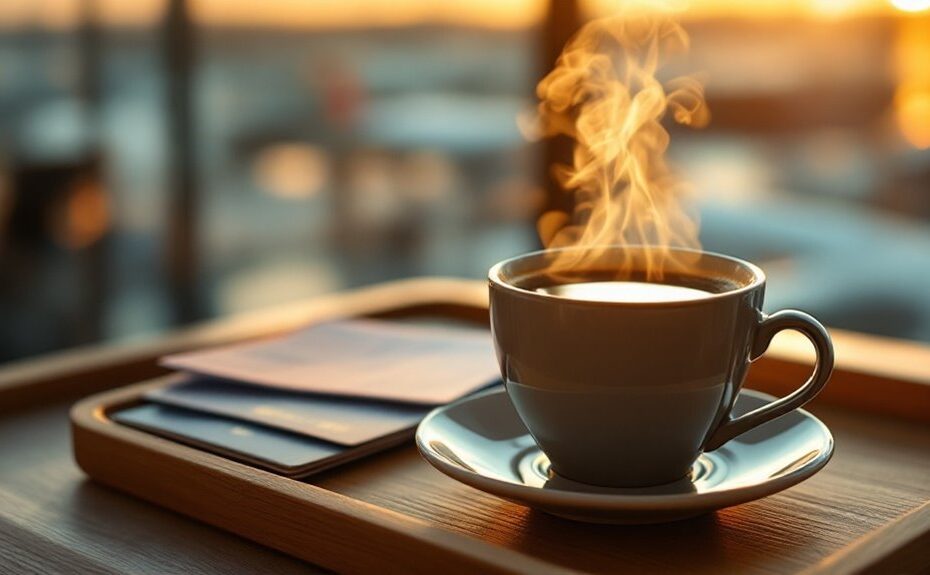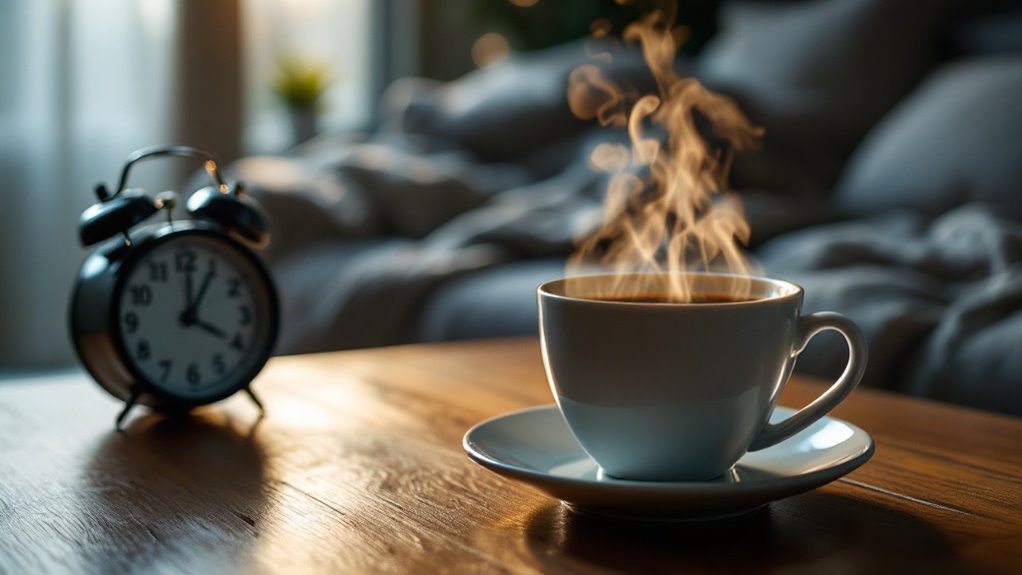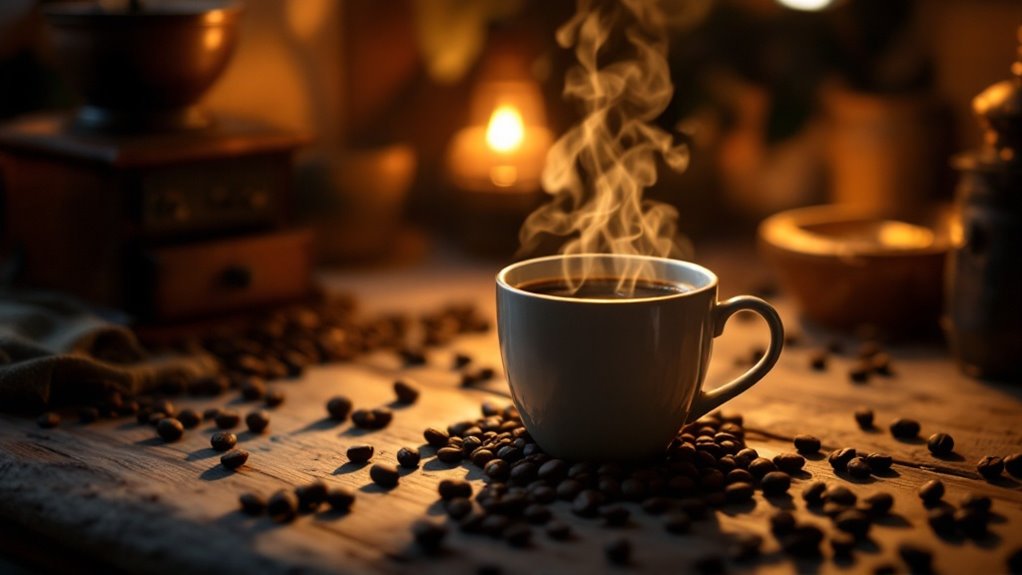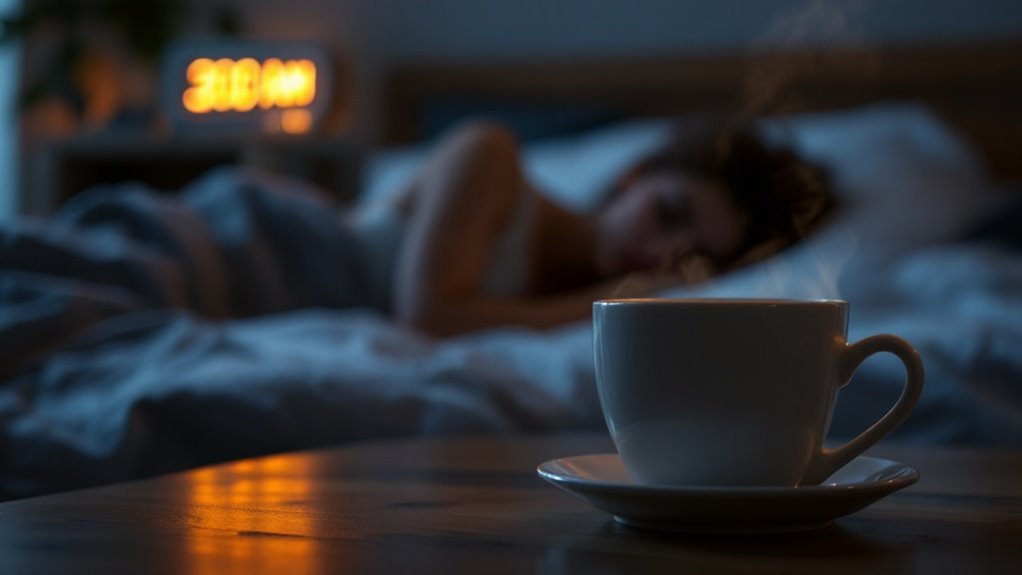



Imagine you've just landed in Tokyo after a long flight from New York, and you're struggling to stay awake during the day. You grab a coffee to power through, but does it actually help with jet lag, or could it make things worse? Timing is key—caffeine can boost alertness when used strategically, but drinking it too late might disrupt your sleep further. The relationship between coffee and jet lag isn't straightforward, and understanding how to use it effectively could make all the difference. What's the best way to time your caffeine intake, and are there other factors you should consider?
Key Takeaways
- Morning caffeine at your destination helps reset your internal clock and aligns it with the new time zone.
- Avoid caffeine 6-8 hours before bedtime to prevent sleep disruption and prolonged jet lag symptoms.
- Eastbound travelers should skip evening caffeine to avoid delaying their sleep-wake cycle and worsening jet lag.
- Combining caffeine with morning light exposure enhances circadian rhythm adjustment for faster jet lag recovery.
- Small, timed doses of caffeine (e.g., 50mg every 2 hours) maintain alertness without overstimulation or sleep interference.
How Caffeine Affects Jet Lag
While caffeine can temporarily boost alertness, its impact on jet lag depends heavily on timing. Caffeine blocks adenosine receptors, reducing sleepiness and helping you stay awake during travel. However, it can also delay your internal clock by 40 minutes to 1 hour 45 minutes, worsening jet lag if consumed at the wrong time. For eastbound travelers, evening caffeine disrupts sleep and prolongs adjustment to the new time zone. Morning caffeine at your destination, though, can help synchronize your internal clock with local time. Studies show that 300 mg of slow-release caffeine improves alertness for eastbound travelers but should be avoided near bedtime. Timing caffeine intake correctly is critical to minimizing jet lag and aligning your body with the new time zone.
Optimal Timing for Coffee Consumption
To minimize jet lag, it's essential to time your coffee consumption strategically based on your travel direction and destination. Consuming caffeine at the wrong time can disrupt your circadian rhythm and worsen symptoms. For eastbound travel, avoid caffeine in the afternoon and evening to prevent interference with sleep. Instead, drink coffee in the morning at your destination to help synchronize your body clock. For westbound travel, moderate caffeine intake can help you stay alert and counteract fatigue caused by lost hours. Avoid caffeine within six hours of bedtime to preserve sleep quality. Use small, timed doses, such as 50mg every two hours, to maintain alertness without overstimulation. Proper timing maximizes the effect of caffeine while minimizing its negative impact on sleep and jet lag recovery.
Caffeine Sources and Their Impact
Caffeine sources like coffee, tea, energy drinks, and chocolate vary considerably in their caffeine content, with brewed drip coffee and energy drinks delivering the highest doses. Consuming half a cup of high-caffeine beverages every two hours can sustain alertness without overloading your system, but excessive intake disrupts sleep quality due to caffeine's 3-5 hour half-life. Timing your intake to avoid consumption 6-8 hours before bedtime guarantees minimal sleep disruption while maximizing travel-related alertness.
Common Caffeine Sources
When managing jet lag, understanding the caffeine content in common sources can help you make informed choices. Coffee, a primary caffeine source, delivers approximately 95 mg per 8-ounce cup, making it a potent option for combating fatigue. Energy drinks, however, vary widely, containing 70-200 mg per serving, often paired with sugar and stimulants that may worsen jet lag symptoms. Tea offers a milder alternative, with 40-70 mg per 8-ounce serving, depending on type and brewing. Dark chocolate provides a subtle boost at 12 mg per ounce, while caffeinated sodas like cola contain 30-50 mg per 12-ounce can. Choosing the right caffeine source can help you manage alertness without exacerbating jet lag symptoms.
Caffeine Content Comparison
While caffeine can help combat fatigue during travel, its effectiveness depends on the source and its caffeine content. Coffee, particularly brewed drip coffee, contains 95-200 mg of caffeine per 8 oz, making it one of the most potent sources. Energy drinks provide 70-100 mg per 8 oz, but their high sugar content may worsen dehydration. Black tea offers a milder option with 40-70 mg per cup, balancing alertness without overstimulation. Caffeinated sodas, like cola, contain 30-50 mg per 12 oz, though their sugar and carbonation can cause discomfort. Dark chocolate, with 20-30 mg per ounce, provides a modest caffeine boost without liquid intake. Choosing the right source guarantees you maximize caffeine's benefits while minimizing potential drawbacks during travel.
Impact on Sleep Quality
Although caffeine can enhance alertness during travel, its effects on sleep quality are significant and often counterproductive. Coffee, a primary source of caffeine, disrupts sleep by reducing deep sleep stages, even when consumed 6 hours before bedtime. A double espresso delays melatonin rise by 40 minutes, interfering with your body's natural sleep-wake cycle. Caffeine's half-life of 3-5 hours means it lingers in your system, fragmenting sleep and reducing restfulness. Consuming caffeine within 8 hours of bedtime can make it harder to fall asleep and impair recovery from jet lag. Even 50mg of caffeine can delay sleep onset by up to 40 minutes, worsening sleep quality. For ideal rest during travel, limit coffee intake, especially in the evening, to mitigate its negative impact on sleep.
The Science Behind Caffeine and Sleep
Caffeine blocks adenosine receptors in your brain, preventing adenosine from signaling sleepiness and promoting alertness. Its half-life of 3-5 hours means it can linger in your system for up to 10 hours, potentially disrupting sleep if consumed too late. Consuming caffeine within 6 hours of bedtime can reduce your total sleep time by up to an hour and delay sleep onset by 40 minutes.
Caffeine Blocks Adenosine Receptors
When you consume caffeine, it binds to adenosine receptors in your brain, blocking adenosine from attaching and signaling drowsiness. Adenosine, a neurotransmitter, accumulates during wakefulness and promotes sleepiness by binding to its receptors. By occupying these receptors, caffeine prevents adenosine from exerting its effects, temporarily reducing feelings of fatigue. This mechanism makes caffeine a potent stimulant, delaying the onset of sleepiness even when adenosine levels are high. Even small doses of caffeine can interfere with adenosine's role, delaying sleep onset by up to 40 minutes. However, caffeine doesn't stop adenosine production; it merely masks its effects. Over time, as caffeine's influence wanes, adenosine can bind to its receptors again, potentially causing a rebound in sleepiness. This interaction underscores caffeine's role in altering sleep-wake cycles.
Half-Life of Caffeine Explained
The half-life of caffeine, typically 3-5 hours, determines how long its stimulant effects persist in your body. During this time, your system metabolizes half of the caffeine consumed. After 5 half-lives (15-25 hours), most caffeine is eliminated, but trace amounts may linger, subtly affecting sleep quality. For example, 100mg of caffeine consumed at 10am leaves about 12.5mg in your system by 10pm, potentially disrupting your ability to fall or stay asleep. Factors like age, liver function, and genetics can influence caffeine's half-life, altering its effects on sleep. By understanding caffeine's half-life, you can time your intake to minimize interference with nighttime rest, ensuring better sleep quality and reducing the risk of sleep disturbances.
Sleep Disruption From Caffeine
Although caffeine is widely consumed for its stimulating effects, it can substantially disrupt your sleep by interfering with adenosine, a neurotransmitter that promotes drowsiness. Caffeine blocks adenosine receptors, delaying sleep onset and reducing total sleep time, especially if consumed within 6 hours of bedtime. Even 100 mg of caffeine can delay your ability to go to bed by 40 minutes. With a half-life of 3-5 hours, caffeine lingers in your system, impairing sleep quality and reducing restorative deep sleep stages. This disruption can throw off your sleep schedule, exacerbating sleep disorders like insomnia. To minimize its impact, avoid caffeine late in the day, allowing your body to naturally wind down and maintain a consistent sleep-wake cycle.
Combining Coffee With Light Exposure
Combining coffee with light exposure can profoundly influence your circadian rhythm, particularly when adjusting to new time zones. When traveling eastward, pairing morning light with coffee delays melatonin production, helping reset your body clock. For westward travel, evening light and earlier caffeine intake align your rhythm with the new time zone. However, improper timing of light and coffee can worsen jet lag, especially for eastbound travelers, by delaying sleep onset. Bright light and caffeine amplify each other's effects, requiring precise coordination to optimize results. For example, caffeine combined with light can delay melatonin surges by up to 105 minutes, markedly impacting circadian adjustments. Strategically timing these elements guarantees they work synergistically, aiding faster adaptation to new time zones without disrupting sleep further.
Managing Sleep While Traveling
When traveling across time zones, managing sleep effectively is essential for minimizing jet lag and aligning your circadian rhythm with the destination. To help your body adjust, sleep during the flight if it aligns with the destination's nighttime. Use noise-canceling headphones, eye masks, and travel pillows to improve in-flight sleep quality. Avoid daytime naps upon arrival, as they can disrupt nighttime sleep patterns and delay adaptation to the new time zone. Gradually shift your sleep schedule 1-2 days before travel to align with the destination's internal clock. Once you arrive, expose yourself to natural light during the day to reset your circadian rhythm. These strategies can help your body adapt more efficiently to the new time zone, reducing the impact of jet lag.
Hydration and Its Role in Jet Lag
Hydration plays a significant role in mitigating jet lag, as dehydration can exacerbate its symptoms. During air travel, the dry cabin environment increases fluid loss, worsening travel fatigue and jet lag. Drinking coffee or alcohol during flights can further dehydrate you, so limit their intake and prioritize water instead. Carry an empty water bottle through security and refill it post-checkpoint to guarantee consistent hydration. Proper hydration supports energy levels and alertness, reducing the severity of jet lag-related fatigue. Electrolyte drinks can also help replenish lost fluids and minerals, aiding recovery from dehydration. By staying hydrated before, during, and after your flight, you'll minimize the impact of jet lag and feel more refreshed upon arrival.
Alternatives to Coffee for Jet Lag Relief
While coffee is often relied upon for its stimulating effects, it may not be the best choice for combating jet lag due to its potential to disrupt sleep patterns. Instead, consider melatonin supplements, which regulate sleep-wake cycles when taken 1-2 hours before bedtime. Light therapy, using devices like light boxes, can reset circadian rhythms by mimicking natural daylight. Staying hydrated with water or electrolyte drinks combats fatigue and supports energy levels during travel. Herbal teas, such as chamomile or valerian root, promote relaxation and improve sleep quality without caffeine. Additionally, short naps of 20-30 minutes can alleviate daytime sleepiness without interfering with nighttime rest. These alternatives provide effective, non-disruptive strategies for managing jet lag symptoms.
Disclosure: As an Amazon Associate, I earn from qualifying purchases.







